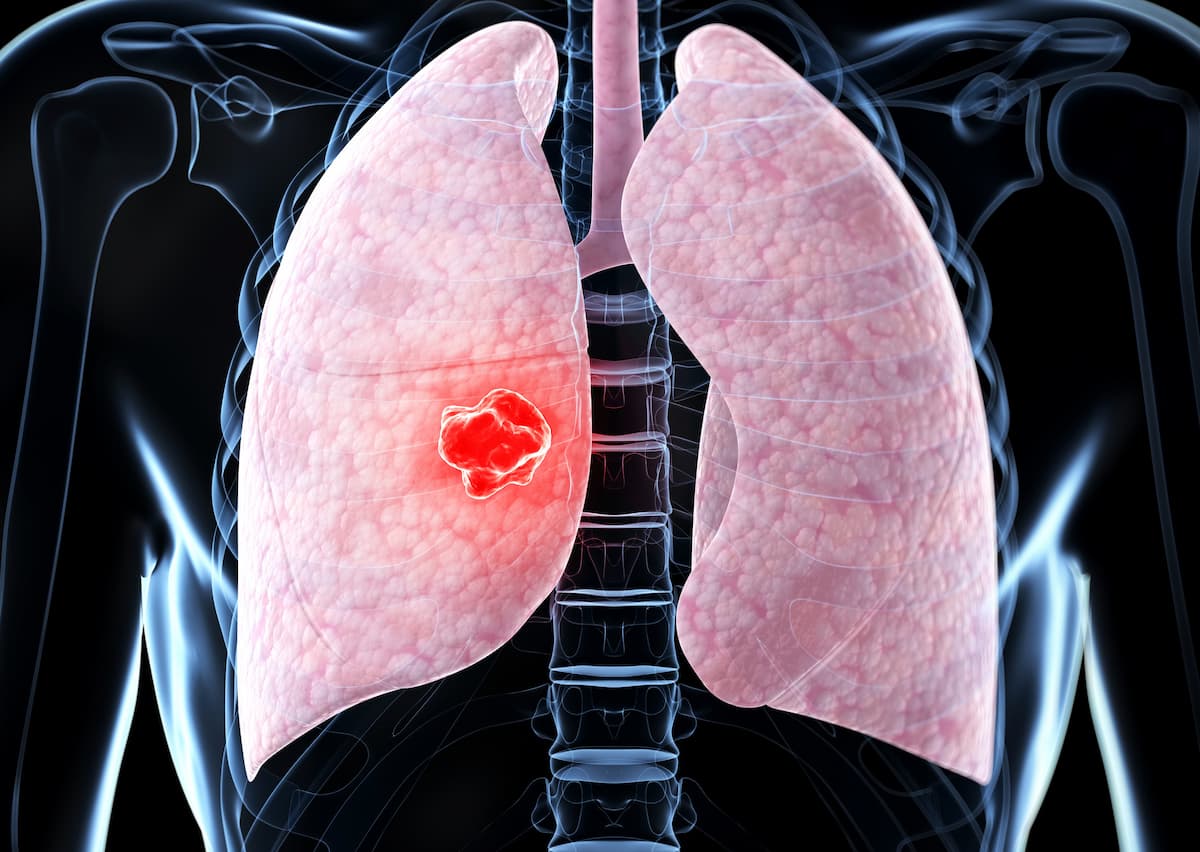Domvanalimab Combo Improves Survival in Advanced/Metastatic NSCLC
Treatment with domvanalimab/zimberelimab also improved progression-free survival vs platinum-based chemotherapy in the phase 3 ARC-10 study.
Treatment with domvanalimab/zimberelimab also improved progression-free survival vs platinum-based chemotherapy in the phase 3 ARC-10 study.

Combining domvanalimab with zimberelimab demonstrated an improvement in overall survival (OS) compared with zimberelimab monotherapy, or platinum-doublet chemotherapy among patients with first-line locally advanced or metastatic squamous or nonsquamous non–small cell lung cancer (NSCLC) with a PD-L1 tumor proportion score of at least 50%, according to a press release on data from the phase 3 ARC-10 study (NCT04736173).1
The median OS was not reached (NR; 95% CI, 13.7-not evaluable [NE]) with domvanalimab/zimberelimab, 24.4 months (95% CI, 7.8-NE) with zimberelimab alone, and 11.9 months (95% CI, 2.7-NE) with platinum-doublet chemotherapy. The domvanalimab-based combination reduced the risk of death by 36% compared with zimberelimab monotherapy (HR, 0.64; 95% CI, 0.32-1.25) and by 57% compared with chemotherapy (HR, 0.43; 95% CI, 0.20-0.93). Additionally, zimberelimab monotherapy yielded a 37% reduction in the risk of death vs chemotherapy (HR, 0.63; 95% CI, 0.30-1.29). At 12 months, the OS rates were 68% with the domvanalimab combination, 57% with zimberelimab alone, and 50% with chemotherapy.
Data showed a median progression-free survival (PFS) of 11.5 months (95% CI, 4.0-26.2) in the domvanalimab combination arm, 6.2 months (95% CI, 2.5-12.3) in the zimberelimab monotherapy arm, and 9.6 months (95% CI, 2.6-16.4) in the chemotherapy arm. Treatment with domvanalimab/zimberelimab decreased the risk of progression or death by 31% compared with zimberelimab monotherapy (HR, 0.69; 95% CI, 0.40-1.18) as well as chemotherapy (HR, 0.69; 95% CI, 0.35-1.38).
A confirmed objective response occurred in 44.7% (n = 17; 95% CI, 28.6%-61.7%) of patients who received domvanalimab/zimberelimab, 35.0% (n = 14; 95% CI, 20.6%-51.7%) of those who were treated with zimberelimab alone, and 35.3% (n = 6; 95% CI, 14.2%-61.7%) of those who received chemotherapy.
Treatment-related adverse effects (TRAEs) resulting in treatment discontinuation affected 23.5% of those in the chemotherapy arm, 10.5% in the domvanalimab/zimberelimab arm, and 7.5% of patients in the zimberelimab monotherapy arm. In each respective treatment arm, investigators reported infusion-related reactions (0% vs 7.9% vs 2.5%), grade 3 or higher TRAEs (47.1% vs 21.1% vs 15.0%), and TRAEs resulting in death (11.8% vs 2.6% vs 10.0%).
Investigators will present full results from the trial in a late-breaking poster session at the Society for Immunotherapy of Cancer (SITC) 2024 Annual Meeting.
“Domvanalimab plus zimberelimab demonstrated a meaningful improvement in [OS] compared with zimberelimab alone, with a 36% reduction in risk of death and a median [OS] that will exceed 2 years,” study investigator Melissa L. Johnson, MD, Director of the Lung Cancer Research Program at Sarah Cannon Research Institute, stated in the news release.1 “These data provide further evidence that co-inhibiting the TIGIT and PD-1 pathways may result in a greater therapeutic benefit over inhibition of the PD-1 pathway alone.”
In part 1 of the ARC-10 study, patients were randomly assigned 2:2:1 to receive domvanalimab at 15 mg/kg plus zimberelimab at 360 mg/kg every 3 weeks, 360 mg of zimberelimab alone every 3 weeks, or platinum-containing chemotherapy consisting of carboplatin plus paclitaxel or pemetrexed every 3 weeks. As of the data cutoff of May 17, 2024, 98 patients were randomly assigned, and 95 received therapy in part 1 of the study, which included those in the domvanalimab/zimberelimab arm (n = 38), zimberelimab monotherapy arm (n = 40), and chemotherapy arms (n = 17).
The trial’s primary end point is PFS based on RECIST v1.1 criteria. Secondary end points include OS, confirmed objective response rate, and safety.
Patients 18 years and older with histologically confirmed, treatment-naïve, locally advanced or metastatic squamous or nonsquamous NSCLC with documented high PD-L1 expression and an ECOG performance status of 0 or 1 were eligible for enrollment on the trial.2 Other requirements for entry included having adequate organ and marrow function as well as 1 or more measurable lesions per RECIST v1.1 guidelines.
References
- Arcus Biosciences announces that domvanalimab plus zimberelimab improved overall survival in ARC-10, a randomized study in patients with PD-L1-high non-small cell lung cancer. News release. Arcus Biosciences, Inc. November 5, 2024. Accessed November 6, 2024. https://tinyurl.com/yck58s43
- Study comparing the combination domvanalimab and zimberelimab with pembrolizumab in untreated locally advanced or metastatic PD-L1-high non-small cell lung cancer (ARC-10). ClinicalTrials.gov. Updated June 6, 2024. Accessed November 6, 2024. https://tinyurl.com/3xerfm8m